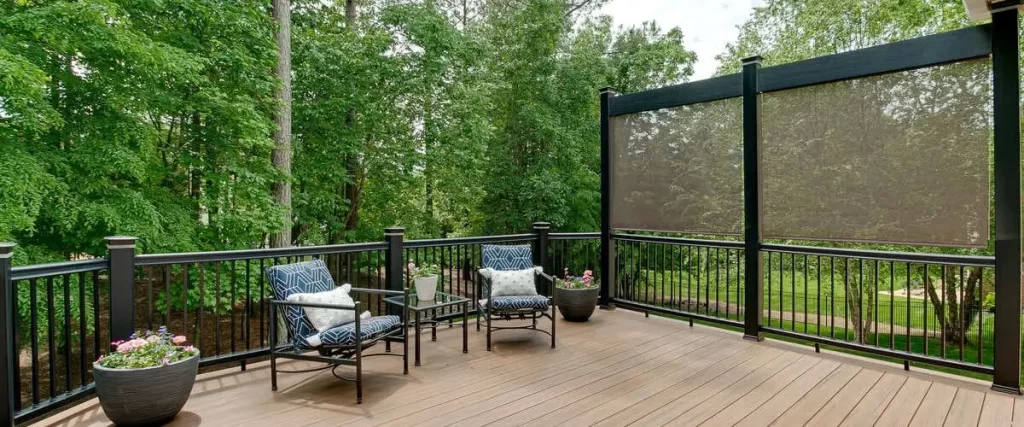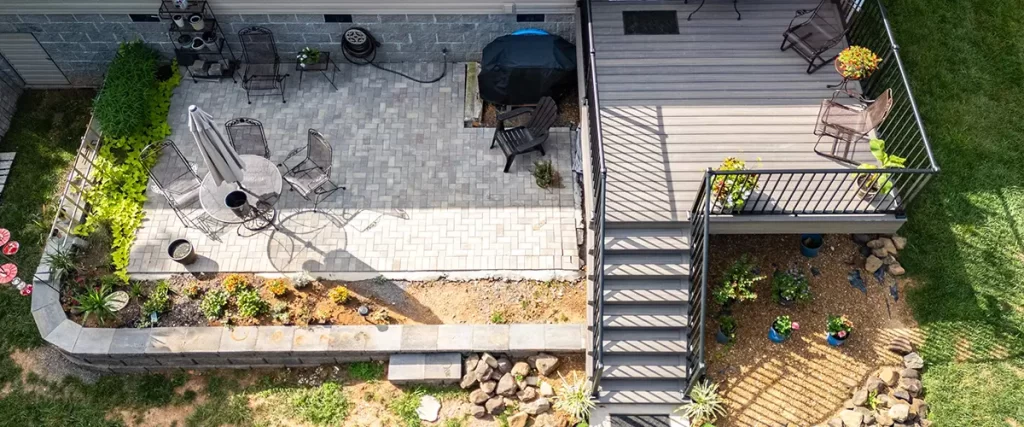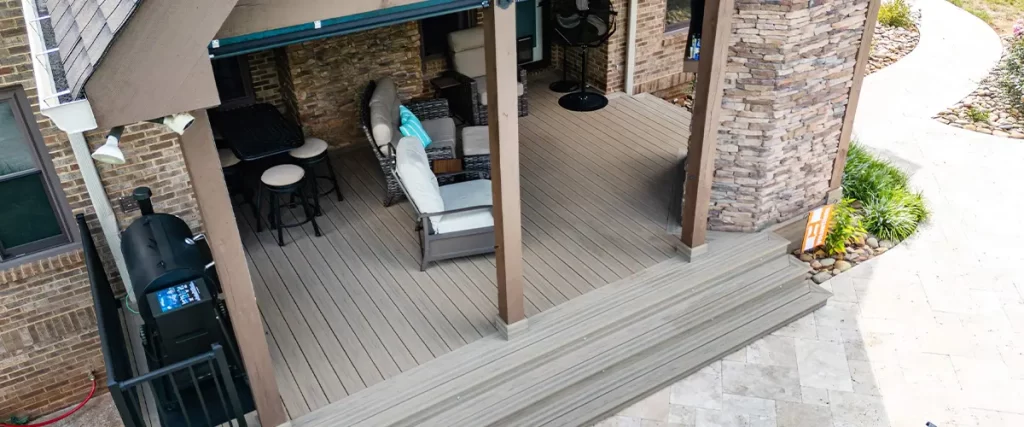You love your deck. It’s your personal escape, your grilling station, your coffee spot on misty mornings. But lately, have you noticed strange claw marks, droppings, or mysterious damage? Maybe a squirrel darts off when you slide open your back door. Or worse, a raccoon’s been rooting through the garbage and scoping out your deck like it’s prime real estate.
Welcome to life as a homeowner in East Tennessee, where beautiful scenery and abundant wildlife go hand in hand, and your deck can become an unintended home for curious critters.
Let’s break down exactly how local wildlife—especially raccoons and squirrels—can impact your decking, why East Tennessee’s unique environment makes this more common than you might think, and most importantly, how you can keep your outdoor space protected.

Why Decks Are Vulnerable in East Tennessee
East Tennessee has one of the most diverse wildlife populations in the southeastern U.S., thanks to our lush forests, mild winters, and the gorgeous ridgelines of the Smokies. But with all that natural beauty comes some unintended consequences for homeowners.
Local Climate and Wildlife Activity
The climate here is humid and temperate—perfect for hardwood forests, which are home to raccoons, squirrels, chipmunks, opossums, and even the occasional skunk. These animals are active year-round, especially in spring and fall when they’re nesting or preparing for winter.
Raccoons and squirrels, in particular, are drawn to decking for three main reasons:
- Shelter: Decks offer dry, warm, and concealed spaces.
- Food access: Garbage cans, pet food, bird feeders—it’s all a buffet to them.
- Nesting: The gaps underneath your deck are prime real estate for raising babies.
Add in East Tennessee’s wooded neighborhoods and proximity to the Smoky Mountains, and you’ve got an ideal setting for wildlife… just not the kind you want underfoot.
How Raccoons and Squirrels Damage Your Deck
Let’s get specific, because not all damage is easy to spot until it becomes a big (and expensive) problem.
Structural Damage
- Scratching and Chewing: Squirrels are rodents, which means they have to chew to keep their teeth filed down. That often means gnawing on deck posts, trim, and even electrical wiring if it’s accessible.
- Digging: Raccoons are incredibly dexterous and strong. They can pull up deck boards or dig under your decking to make dens.
Sanitary Hazards
- Droppings: Both raccoons and squirrels leave behind waste that can pose health risks, especially raccoon feces, which may contain roundworm eggs.
- Parasites: Fleas, ticks, and mites can hitch a ride with these animals and infest your outdoor areas (and your pets).
Noise & Nuisance
- Nighttime Activity: Raccoons are nocturnal, which means you might hear them scratching or rummaging under your deck at night.
- Daytime Sightings: Squirrels running along railings and posts might be cute—until you realize they’re nesting in your deck supports.

How to Prevent Wildlife from Damaging Your Deck
You’re not powerless—far from it. With a few proactive steps, you can deter animals and preserve the life of your deck for years to come.
1. Seal Off Access Points
- Install Skirting or Lattice: Use hardware cloth behind decorative lattice to block entry underneath your deck.
- Use Gravel: Laying a gravel trench around the base of your deck discourages digging.
- Seal Gaps and Cracks: Use steel wool and caulk to close small openings.
2. Eliminate Food Sources
- Secure Trash: Use wildlife-proof trash cans with locking lids.
- Remove Pet Food and Bird Feeders: Or bring them in at night.
- Clean Up BBQ Grills: Grease and food particles attract wildlife.
3. Use Natural Deterrents
- Scent Repellents: Ammonia-soaked rags or predator urine granules (available at garden stores) can deter nesting.
- Motion-Activated Lights or Sprinklers: These scare off nocturnal visitors like raccoons.
4. Keep Your Deck Maintained
- Stain and Seal: Properly treated wood is less attractive to chewers and easier to clean.
- Trim Back Trees: Squirrels often access decks via overhanging limbs.
- Inspect Regularly: Early signs of wildlife can prevent major repairs later.
Best Decking Materials to Resist Wildlife Damage
If you’re building a new deck or upgrading an old one, the material you choose makes a big difference.
Composite Decking
This is a favorite in East Tennessee for a reason. Composite boards are made from wood fibers and plastic, making them:
- Resistant to chewing (squirrels don’t like the texture)
- Easy to clean (droppings don’t seep in)
- Long-lasting (minimal upkeep, even in humid conditions)
Pressure-Treated Wood
While still prone to chewing and scratching, pressure-treated wood holds up better than untreated lumber and resists rot.
Best Decking Manufacturers for East Tennessee Homes
Choose trusted brands known for durability, weather resistance, and pest-resilient features.
Top Decking Manufacturers
- Trex® – Industry leader in composite decking with strong scratch resistance and eco-friendly materials.
- TimberTech® – Beautiful finishes with durable capping, making it hard for squirrels to chew and easy to clean.
- Fiberon® – Low-maintenance composite with a lifetime performance warranty and excellent color retention.
- Deckorators® – Mineral-based composite decking that resists water, decay, and wildlife interference.
- YellaWood® – Pressure-treated pine made to last longer in high-moisture regions like East Tennessee.
FAQ: Wildlife & Decking in East Tennessee
Is it illegal to remove raccoons or squirrels myself in Tennessee?
Yes and no. According to Tennessee Wildlife Resources Agency, homeowners can remove nuisance wildlife but must follow regulations. In some cases, a permit or licensed trapper is required.
How do I know if animals are nesting under my deck?
Look for droppings, digging, insulation or leaves being dragged under, and nighttime noises.
Will insurance cover wildlife damage?
It depends on your policy. Many homeowners’ policies exclude gradual damage caused by pests. It’s worth reviewing with your agent.
How often should I inspect my deck for animal activity?
At least once every season, especially in early spring and fall when nesting is most common.

Your Deck Doesn’t Have to Be a Wildlife Hotel
Look, we’re lucky to live in a place as naturally beautiful as East Tennessee. But that doesn’t mean you need to share your backyard retreat with a family of raccoons. With a few smart strategies—like sealing access points, choosing the right materials, and doing seasonal maintenance—you can keep your deck safe, sound, and squirrel-free.
If you’re noticing signs of animal damage or thinking about upgrading your deck with more wildlife-resistant materials, give us a call at (865) 801-4545. We’ll walk you through the best solutions for your home and help you reclaim your outdoor space for you, not the critters.

